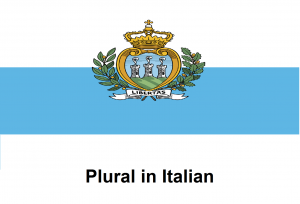Difference between revisions of "Language/Italian/Grammar/Plural"
(Plural in Italian) |
|||
| Line 1: | Line 1: | ||
[[File:Plural in Italian.png|alt=Plural in Italian|thumb|Plural in Italian]] | |||
. | |||
Hello everybody, | |||
In | In today's lesson you will learn some useful vocabulary about '''¨PLURAL¨''' in Italian | ||
Feel free to edit this page by adding new words and expressions ! | |||
Good learning ! :) | |||
. | |||
. | |||
== '''Some words for the Plural in Italian''' == | |||
{| class="wikitable" | |||
!<big>'''ENGLISH'''</big> | |||
!<big>'''PRONUNCIATION'''</big> | |||
'''<big>ENGLISH</big>''' | |||
!'''<big>ITALIAN</big>''' | |||
!'''<big>PRONUNCIATION</big>''' | |||
'''<big>BRAZILIAN</big>''' | |||
'''<big>PORTUGUESE</big>''' | |||
!'''<big>BRAZILIAN</big>''' | |||
'''<big>PORTUGUESE</big>''' | |||
|- | |||
| | |||
| | |||
| | |||
| | |||
| | |||
|- | |||
|'''<big>General</big>''' | |||
'''<big>Rule (-i)</big>''' | |||
| | |||
|<big>'''LİBRO'''</big> | |||
| | |||
| | |||
|- | |||
| | |||
| | |||
|<big>'''LİBRİ'''</big> | |||
| | |||
| | |||
|- | |||
| | |||
| | |||
| | |||
| | |||
| | |||
|- | |||
| | |||
| | |||
|'''<big>QUADERNO</big>''' | |||
| | |||
| | |||
|- | |||
| | |||
| | |||
|<big>'''QUADERNİ'''</big> | |||
| | |||
| | |||
|- | |||
| | |||
| | |||
| | |||
| | |||
| | |||
|- | |||
| | |||
| | |||
|'''<big>CANE</big>''' | |||
| | |||
| | |||
|- | |||
| | |||
| | |||
|<big>'''CANİ'''</big> | |||
| | |||
| | |||
|} | |||
==General rule== | ==General rule== | ||
Revision as of 00:00, 3 May 2020
.
Hello everybody,
In today's lesson you will learn some useful vocabulary about ¨PLURAL¨ in Italian
Feel free to edit this page by adding new words and expressions !
Good learning ! :)
.
.
Some words for the Plural in Italian
| ENGLISH | PRONUNCIATION
ENGLISH |
ITALIAN | PRONUNCIATION
BRAZILIAN PORTUGUESE |
BRAZILIAN
PORTUGUESE |
|---|---|---|---|---|
| General
Rule (-i) |
LİBRO | |||
| LİBRİ | ||||
| QUADERNO | ||||
| QUADERNİ | ||||
| CANE | ||||
| CANİ |
General rule
-i
Male names usually form the plural in -i:
- libro becomes libri,
- quaderno becomes quaderni,
- cane becomes cani
-e
Female names usually want the plural in -e:
- mamma becomes mamme,
- pizza becomes pizze,
- mela becomes mele
But there are some exceptions. For example, mano, that is a female name, becomes mani or problema, that is a male name, becomes problemi.
Exceptions
-ca,-ga
Names which end with -ca,-ga form the plural in -che,-ghe:
- banca becomes banche
- panca becomes panche
-cia, -gia becomes -ce,-ge
Names which end in -cia, -gia form the plural in -ce,-ge (if preceded by a consonant):
- spiaggia becomes spiagge,
- goccia becomes gocce
-cia, -gia becomes -cie, -gie
Names which end in -cia,-gia form the plural in -cie, -gie (if preceded by a vowel):
- ciliegia becomes ciliegie,
- camicia becomes camicie
-cìa,-gìa
Names which end in -cìa,-gìa form the plural in -cìe,-gìe:
- farmacia becomes farmacie,
- magia becomes magie
-co,-go
Names which end with -co,-go form the plural in -ci, -gi or in -chi,-ghi:
- amico becomes amici,
- medico becomes medici,
- caco becomes cachi,
- lago becomes laghi
No change
Some names are written in the same way in both forms:
- papà becomes papà,
- città becomes città,
- re becomes re,
- crisi becomes crisi
irregular forms
Some names have irregular plural forms as well:
- bue becomes buoi,
- uomo becomes uomini,
- dio becomes dei,
- tempio becomes templi
